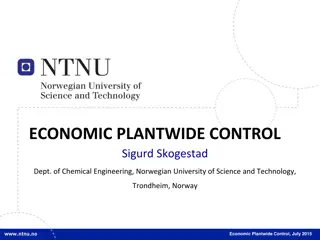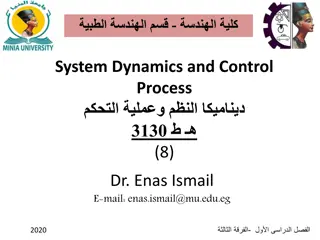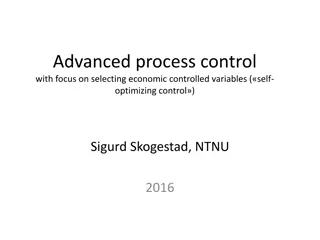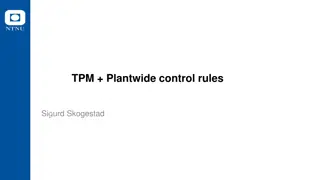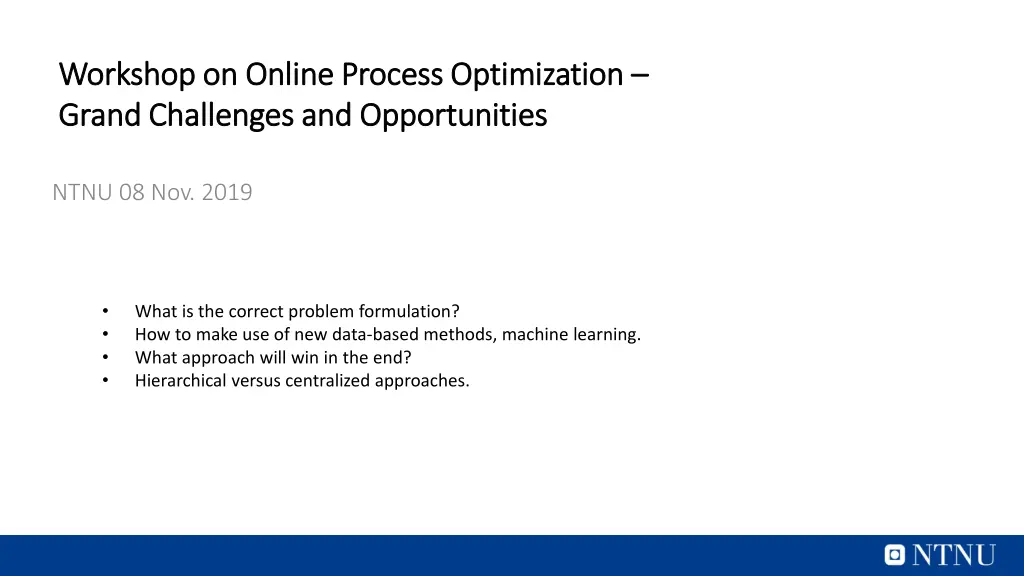
Online Process Optimization Workshop Highlights
Explore key discussions and insights from the Online Process Optimization Workshop, including topics on machine learning, hierarchical vs. centralized approaches, and innovative control strategies. Join experts and researchers in uncovering the latest advancements in process optimization methodologies.
Download Presentation

Please find below an Image/Link to download the presentation.
The content on the website is provided AS IS for your information and personal use only. It may not be sold, licensed, or shared on other websites without obtaining consent from the author. If you encounter any issues during the download, it is possible that the publisher has removed the file from their server.
You are allowed to download the files provided on this website for personal or commercial use, subject to the condition that they are used lawfully. All files are the property of their respective owners.
The content on the website is provided AS IS for your information and personal use only. It may not be sold, licensed, or shared on other websites without obtaining consent from the author.
E N D
Presentation Transcript
Workshop on Online Process Optimization Workshop on Online Process Optimization Grand Challenges and Opportunities Grand Challenges and Opportunities NTNU 08 Nov. 2019 What is the correct problem formulation? How to make use of new data-based methods, machine learning. What approach will win in the end? Hierarchical versus centralized approaches.
09:00 - 09:15 09:15 - 09:30 09:30 - 09:50 Coffee and mingling Welcome and Introduction by Sigurd Skogestad, NTNU Short introduction by NTNU groups working on online process optimization (one slide overview on each research group). Johannes J schke, Sebastien Gros, Lars Imsland, Morten Hovd, Alexey Pavlov, Sigurd Skogestad. Program Program 09:50 - 10:50 Keynote talk by Jay H. Lee, KAIST, Korea (45min + 15 min discussion) Model based Control and Reinforcement Learning: Alternatives or Complementary? 10:50 - 11:10 11:10 12:00 Coffee Break Keynote talk by David Q. Mayne, Imperial College, UK (25min +25min) discussion). Robust and Stochastic MPC; what is the correct formulation? 12:00 - 13:00 Lunch at Kjelhuset (all invited) 13:00 - 13:20 Talk by Sergio Lucia, TU Berlin, Germany (10min + 10min discussion) Approximate model predictive control based on machine learning and probabilistic verification 13:20 - 13:40 Talk by John B. J rgensen, DTU, Denmark (10min + 10min discussion) "Nonlinear model predictive control based on stochastic differential equations 13:40 - 14:00 14:00 - 14:40 Industrial needs Discussions with Manfred Morari, ETH/U Penn, Switzerland/USA ** (30 min interview+ 10 min discussion). Discussant - Sigurd Skogestad 14:40 - 15:15 15:15 - 15:30 15:30 - 16:00 Group Work Open challenges (+ coffee) Each group presents short conclusions Concluding panel discussion Good problems to work on for the future. Panel members: Mayne, Morari, Lee (Moderator: Skogestad) 2
Dinesh Krishnamoorthy (postdoc) Adriana Reyes Lua Cristina Zotica (MS NTNU, 2017) Energy efficient operation of power plants (HighEFF). From Aug 2017 Allyne Machado dos Santos (MS UFRJ, Brazil, 2019) Machine learning for process optimization (SUBPRO). From Feb. 2019 David Perez Pineiro (MS NTNU, 2019) Optimal operation of energy storage (HighEFF). From Aug. 2019 Lucas Ferreira (MS, UFRJ, 2019) Machine learning for process optimization (IKTPLUSS). From Sep. 2019 Saket Adhau (MS, Pune, India, 2019 Machine learning for process optimization (IKTPLUSS). From Sep. 2019
John Doyle (1985): There are two ways a theorem can be wrong (from an engineering point of view): Either it s simply wrong Or the assumptions make no sense Skeleton in the closet? Fact: Essentially all stability and convergence results for optimal control, MPC and nonlinear control assume full state information, that is, perfect measurement of all states
Solution: Loop transfer recovery (LTR). Small weight on measurement noise to make estimator fast

